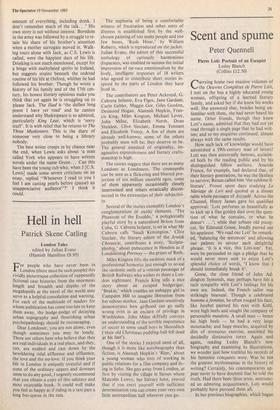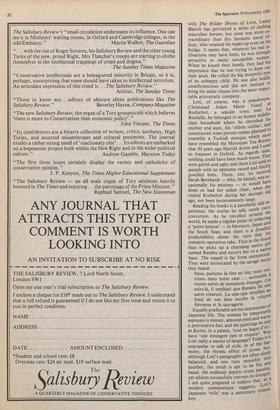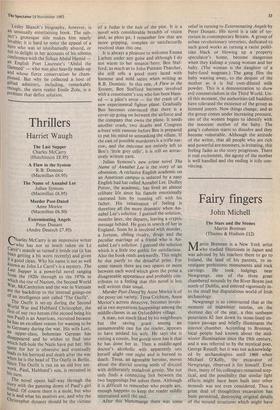Scent and spume
Peter Quennell
Pierre Loti: Portrait of an Escapist Lesley Blanch (Collins £12.50) rlarrying home two massive volumes of
the Oeuvres Completes de Pierre Loti, I met on the bus a highly educated young woman, offspring of a learned literary family, and asked her if she knew his works well. She answered that, besides being un- familiar with them, she had never heard his name. Other friends, though they knew Loti's name, admitted that they had not yet read through a single page that he had writ- ten; and so my enquiries continued, almost always with the same results.
How such lack of knowledge would have astonished a 19th-century man of letters! Loti was then universally famous, acclaim- ed both by the reading public and by his distinguished fellow authors. Anatole France, for example, had declared that, of their literary generation, he was the likeliest to survive; Renan called him 'the sublime il- literate'. Proust spent days studying Le Mariage de Loti and quoted at a dinner table whole passages of Aziyade. Across the Channel, Henry James gave his qualified approval: `Loti performs so beautifully as to kick up a fine golden dust over the ques- tion of what he contains, or what he doesn't ...'; while that urbane old pussy- cat, Sir Edmund Gosse, loudly purred out his applause. 'We read our Loti' he remark- ed, 'balancing the sentences' and allowing our palates to savour each delightful phrase. 'It is a vice, this Loti-ism'. Yet, were he persuaded to sign a pledge that he would never more seek to enjoy Loti's splendid choice of words, 'I know that I should immediately break it'.
Gosse, the close friend of John Ad- dington Symonds, may perhaps have felt a tacit sympathy with Loti's feelings for his own sex. Indeed, the French sailor was strikingly bisexual. Though a celebrated homme a femmes, he often rouged his face, like Jezebel painted his eyes with Kohl, wore high heels and sought the company of personable matelots. A small man — hence his high heels — he had a very large moustache; and huge muscles, acquired by dint of strenuous exercise, ennobled his decidedly diminutive torso. Again and again, reading Lesley Blanch's new biography and examining its illustrations, we wonder just how truthful his records of his feminine conquests were. Was he not the greatest mythomaniac in the history of writing? Certainly, his contemporaries ap- pear never to have doubted that he told the truth. Had there been three sexes, announc- ed an admiring acquaintance, Loti would probably have pursued them all.
In her previous biographies, which began
The Spectator 19 November 1983 with The Wilder Shores of Love, Lesley Blanch has portrayed a series of dashing masculine heroes; but none was more ex- traordinary than this fantastic naval of- ficer, who retained his make-up even on the bridge. It seems that, whatever his real in- clinations may have been, he was strongly attractive to many susceptible women. When he kissed their hands, they had the impression that he was trying to draw out their souls. He rolled the big mournful eyes of an unhappy child. He was also boldly unselfconscious and did not hesitate to bring his sailor chums into the most respec- table aristocratic company. Loti, of course, was a pseudonym. Christened Julien Marie Viaud at Rochefort, a seaside town near La Rochelle, he belonged to an honest middle- class household where he cherished his mother and aunt, his `cheres vieilles', and constructed some private rooms planned to resemble a Turkish mosque which must have resembled the Moroccan Tea Rooms that 50 years ago Harold Acton and I used to frequent in Oxford. As regards taste, nothing could have been much worse. They were garish and ugly; and there Loti used to jpeawr ae ldl ee dw i bt he i at belts. immense ts bwbo, r d bae n d retchei icvke dl Y Sarah Bernhardt — who, he hinted, was oc- casionally his mistress — or would have done so had her sedan chair, when she visited Rochefort during her decrepit old age, not been inconveniently large. Reading his books is a peculiarly odd ex- perience; the stories he tells rarely carry conviction. As he travelled around the world, he made a regular point of collecting a 'petite epouse' — in Morocco, Japan and the South Seas; and there is a dreadful predictability about the turn that his romantic narratives take. Thus in the South Seas he picks up a charming native girl named Rarahu and escorts her to a native feast. The sequel is far from unexpected.. they by the savage music Nous partions la tete en feu; nous ren: Mons dans notre case ... accessible a toutes sortes de sensations &valves. Ces soirs-la, it semblait que Rarahu fat Ole fifoenvdreu d see e son oln la s uvautre creature. La upa-upa reveillait au me u ag
Equally predictable are his impressions of
inculte la voluPte Japanese life. The woman he temporarily espouses is minute, almond-eyed and waves a provocative fan; and the paintings he sees at Kyoto, in a palace, 'tout en laque d'or have 'une etrangete rare et exquise'. W. i as Loti really a master of language? Today it is unpopular to talk of style, or of the har- mony, the rhymic effect of prose; but, although Loti's paragraphs are often nicely balanced, and one runs smoothly another, the result is apt to be flat and banal. He endlessly depicts erotic passion, yet seldom successfully conveys its strength. I am quite prepared to believe that, as.,a modern commentator suggests, Lou s Japanese 'wife' was a mercenary
boy. into
errand- Lesley Blanch's biography, however, is an unusually entertaining book. The sub- ject's grotesque side makes him nearly lovable; it is hard to resist the appeal of a hero who was so unashamedly absurd, or not to delight in her accounts of his solemn conference with the Sultan Abdul Hamid an English Poet Laureate's 'Abdul the Damned' — who was also heavily made-up and whose fierce conservatism he cham- pioned. But why he collected a host of gifted admirers, including, remarkably enough, the stern realist Emile Zola, is a Problem that defies solution.




























































 Previous page
Previous page